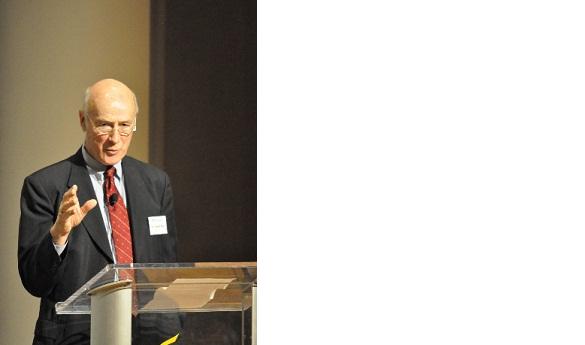Joseph Nye talks leadership and politics in Mason lecture
"Do leaders matter?"
This is the question Dr. Joseph Nye posed to his audience at George Mason University the morning of Wednesday, Feb. 6. Nye is famous in the political science community as one of the founders of the neoliberal theory and the former dean of Harvard’s School of Government. Nye visited Mason at the request of sophomore Mason student Peter Pham. In the summer of 2012, Pham took a bus to Cambridge to meet Dr. Nye and extend an invitation to host a lecture at Mason. Nye's lecture focused around what role the leadership of individuals does or does not play in global events.
Nye began the talk by taking the audience back one hundred years, to the eve of the First World War. While the war was inevitable, Nye pointed out that different American presidents would have approached the situation in distinctive ways.
“If Taft or Roosevelt had been elected, would America still have entered WWI? I think so, but it would have been presented very differently,” Nye said.
Nye added that successful presidents know how to use shifts in global dynamics to their advantage.
“After the Munich Conference, [Franklin Delano] Roosevelt saw that Hitler was a threat but was unable to convey that to the American public,” Nye said. “Pearl Harbor allowed Roosevelt to take on Hitler.”
Nye returned to the point that different presidents may have approached these events differently:
“If Limburg had been president in WWII, the world would have turned out very differently. If Roosevelt had kept Wallace as the vice president, who was pacifist and pro-Soviet, what would a Wallace presidency have looked like? He would have been more conciliatory towards the Soviets. Would we still have lived in a bi-polar world?”
During the lecture, Nye emphasized that these leaders each played important roles.
“The end of the Cold War was brought about by cultural shifts and another leader, Gorbachev,” Nye said. “If Andropov (one of the hard line, preceding Soviet leaders) had remained in General Secretary, the Soviet Union might have stuck around another 10 years. Reagan wouldn’t have been hailed as the American hero.”
Finally, Nye mentioned that leadership decisions often come down to chances the leaders do not take. Nye called these leaders “the dogs that didn’t bark,” a reference to the Sherlock Holmes story “Silver Blaze.” Nye used President George Bush Sr. during the collapse of the Soviet Union as his primary example.
“People were asking him why he wasn’t making speeches and dancing on the Berlin Wall, and he responded that it would only have made Gorbachev’s job harder,” Nye said.
“Do leaders matter?” He asked again, “Yes, but they’re not always the ones you expect.”
After his lecture, Nye moderated a debate between four students from Mason, Duke and Princeton over the United States’ embargo against Cuba and America’s base in Guantanamo Bay. Ultimately, Pham, the Mason representaive, won the debate in his argument for closing Guantanamo and lifting the Embargo. Nye followed the debate with a question and answer session with students, focusing on the leadership in Russia and China.

